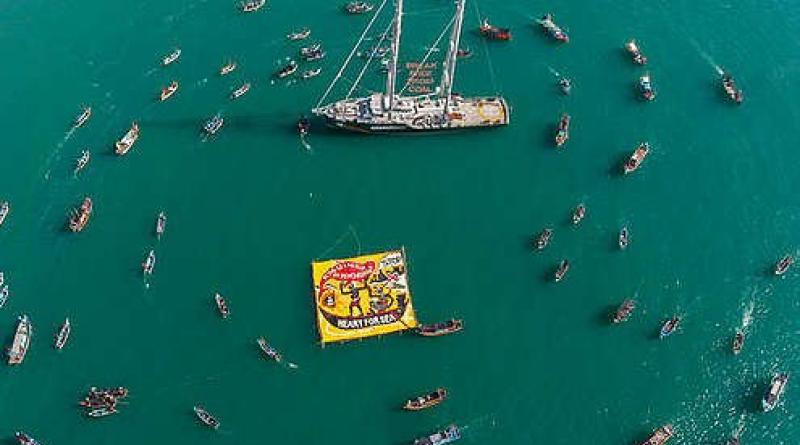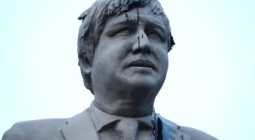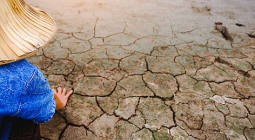Be it the climate emergency, the pandemic, the war in Ukraine or any of the multiple other intersectional challenges the world is facing today, we are, inexplicably, in a crisis of imagination. Since human beings have been around, we have adapted the way in which we live, strive and survive. What we have come to realise is that the systems we live in – within which our current economic system is a linchpin – are founded on inequality, overconsumption, the pursuit of infinite growth at the expense of people and the environment, and the unsustainable extraction of finite resources. Our current systems’ foundations were planted in harm not peace, and this extends to our economic structures.
Our economic system ignores planetary boundaries, leading to ecological collapse, climate crisis, biodiversity loss alongside many other environmental disasters, and grave human rights abuses.
These devastating impacts have been known, and tolerated, for far too long. Tragically, there has been a failure in reimagining a harmonious and peaceful economic system, a lack of action to explore, an unwillingness to embrace change and a misconception that time is on our side. The window is closing on opportunities to prevent climate and biodiversity collapse, and instead recreate an economic system that works in harmony with people and the planet. With courage and hope, and political commitment, we can radically transform our economic system so we don’t just survive but allow future generations to thrive in harmony with nature and each other. Transforming our economic system, due to its sheer power, would have an immediate and long-lasting impact on all of the intersectional systems we are currently struggling to survive within.
The climate and nature crisis has come about due to poor choices – we can and must be better at deciding what is best for our planet and all people. This is not about making the economic system more sustainable through incremental changes, because the very foundations of it were rotten from the start. We must dream big. We must plant new seeds for the future.
For many of us in 2022 – no matter where we were born in the world – it is generally assumed as fact that an economic system based on extractivism and mass consumption is the inevitable, final stage of market evolution – for the benefit of all.
But at the moment, we are working for and within an economic system that is harming us. There are a huge number of alternative economic approaches, theories, proposals and experiments out there that are better designed to work for people and the planet.
Many of these new economic approaches are already being actively developed, discussed and implemented. A lot of them are also on-the-ground implementation efforts that are small-scale or not interconnected, which means they mostly haven’t been heard of.
What’s clear is that we can have an economic system that works for the many, not the few – and in harmony with nature.
Two hundred and fifty years ago the founding ideology of our current Western economic system was born: the ‘invisible hand’ would steer free markets forces, magically turning the ‘strive’ for individual profit into the benefit of all. Not accidentally, 250 years ago fossil fueled industrialisation and the systematic, large-scale extraction of natural resources picked up, producing a new social entity known today as the ‘working class’. Then 250 years later – to now – we see how this ‘invisible hand’ has turned out to be destructive and inequitable, putting the planet and people in peril.
Today we have to look at the ‘public hand’, namely governments and their role in the economic system. Hundreds of billions of public money flows to fossil fuels rather than to climate solutions, despite the very clear science that oil, coal and fossil gas are not compatible with a green, harmonious and safe future. Removing fossil fuel subsidies could, alone, reduce emissions by up to 10% globally by 2030 and free up money flows to renewable energy and the upskilling of workers currently employed in polluting industries.
However we imagine a future economic system, people will continue to meet their existential needs. Nearly 8 billion people living on the planet today – expected to grow up to 11 billion by the end of the century – work and strive to produce food, shelter and everyday commodities. But this has to happen in an authentically sustainable and affordable way, within the limits of the planet’s natural boundaries.
A fundamental transformation of our economic basis, the infrastructure and production machinery that modern societies developed over the past centuries, is called for. The ‘invisible hand’ of our current economic system is betraying us all. Substantial public investments can be better used to transform the hardware of our economies: our entire built environment, housing, our mobility system, food and energy production. This in turn would reset the foundations of our economic system to one based on the values of people and planet, not on the value of profit at any cost.
We need to ask ourselves how to establish solidarity, equity and equality in societies where the gap between the poor and the rich is ever growing. What is everyone’s fair share in contributing to the functioning of our communities and to the accomplishment of the social contract? A harmonious economic system that works for people and within planetary boundaries would have a ripple effect in our other failing systems that are in need of urgent, radical transformation.
This is your invitation today to explore our collective imagination – envisioning a world that is peaceful, fairer, healthier, greener and more, by transforming our economic system as a first step, and making those dreams our reality.
Markus Trilling is an EU Economic Advisor at the Greenpeace European Unit.





